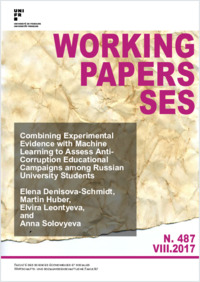Combining experimental evidence with machine learning to assess anti-corruption educational campaigns among Russian university students
BP2-STS
-
01.08.2017
43
English
This paper examines how anti-corruption educational campaigns affect the attitudes of Russian university students towards corruption and academic integrity. About 2,000 survey participants were randomly assigned to one of four different information materials (brochures or videos) about the negative consequences of corruption or to a control group. Using machine learning to detect effect heterogeneity, we find that various groups of students react to the same information differently. Those who commonly plagiarize, who receive excellent grades, and whose fathers are highly educated develop stronger negative attitudes towards corruption in the aftermath of our intervention. However, some information materials lead to more tolerant views on corruption among those who rarely plagiarize, who receive average or above average grades, and whose fathers are less educated. Therefore, policy makers aiming to implement anti-corruption education at a larger scale should scrutinize the possibility of (undesired) heterogeneous effects across student groups.
- Collections
- Faculty
- Faculté des sciences économiques et sociales et du management
- Language
-
- English
- Classification
- Economics
- Other electronic version
- Series statement
-
- Working Papers SES ; 487
- License
-
License undefined
- Identifiers
-
- RERO DOC 305168
- RERO R008702586
- Persistent URL
- https://folia.unifr.ch/unifr/documents/305953
Statistics
Document views: 234
File downloads:
- Document: 421
